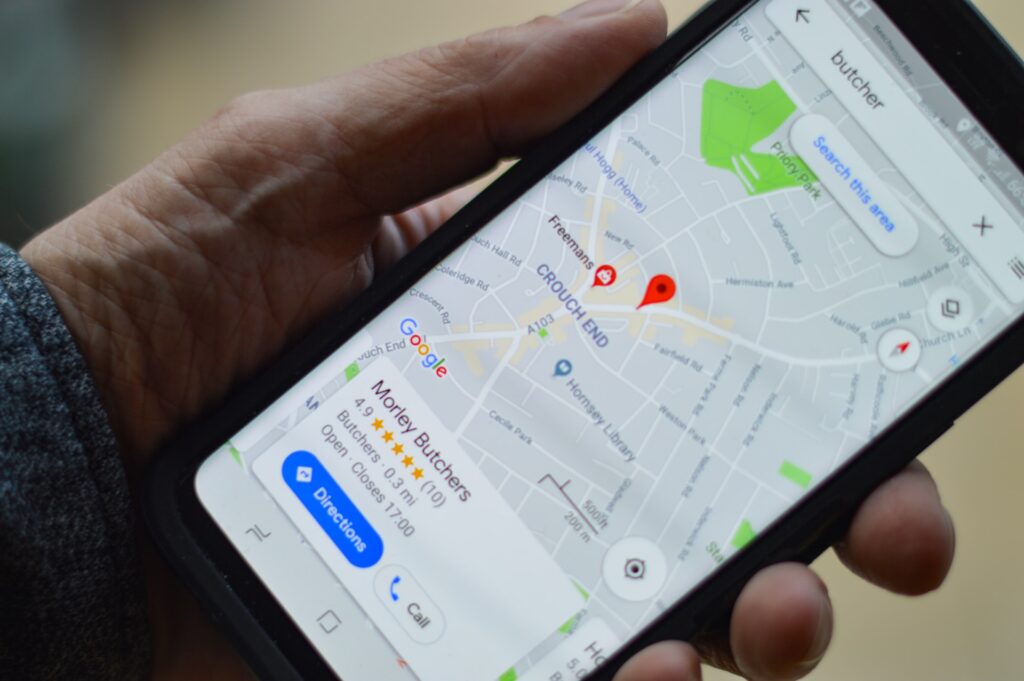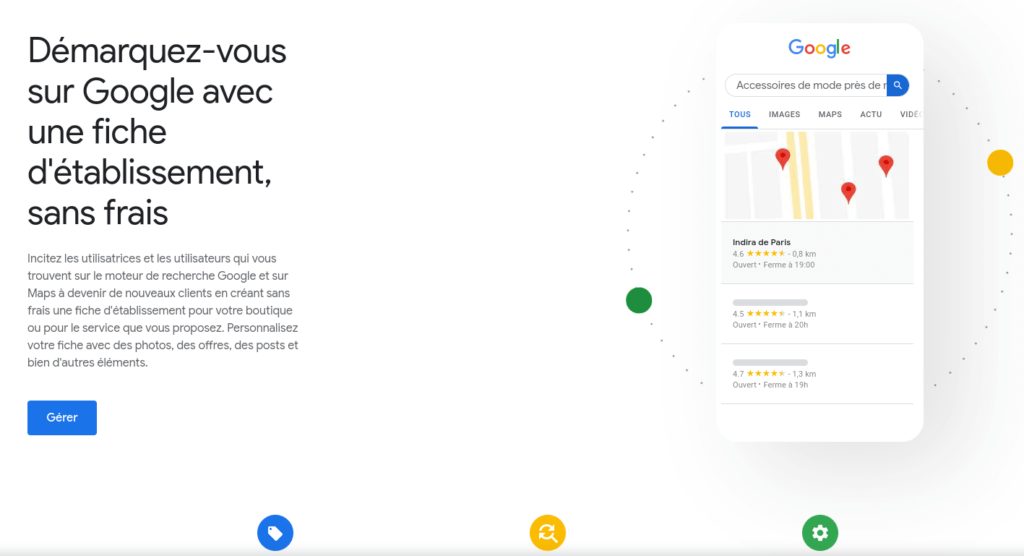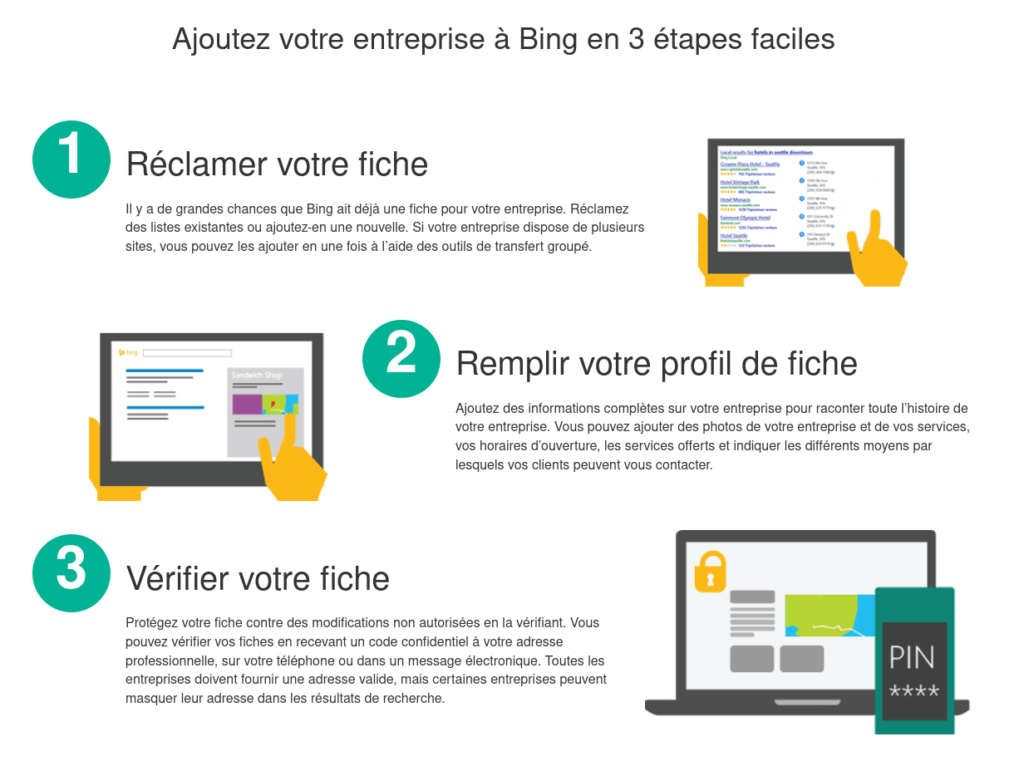Local SEO plays a crucial role in bringing new customers to your geographical area.
By helping them find you easily with just a few clicks, you make it simple for them to find what they’re looking for and ensure the continued growth of your business with a steady stream of new customers.
This article presents the key points to consider to ensure a strong local search engine presence.
What is Local SEO?
How Does Local SEO Work?
Local SEO is an online marketing strategy that aims to optimize your online presence on a local level, primarily through localized search results.
This means that if you’re a dentist’s office located in London, for example, you want people to easily find you by typing keywords like ‘dentist London’ or simply ‘dentist’ if they use their search engine’s proximity search.
What’s the Difference Between Traditional SEO and Local SEO?
Traditional SEO involves optimizing your website for factors unrelated to your geographical location. For example, in the case of our dentist’s office example, it involves creating content that allows you to appear in search results for more general keywords like ‘molar extraction’ or ‘how to brush your teeth effectively?’
These two SEO strategies complement each other and should be done together when working on a locally focused website.
Why is Local SEO Important for Small Businesses?
Local SEO can make a difference in your online visibility, especially if you’re a small business or a sole proprietor.
Now, imagine you’re starting your pizzeria. You could have the best tomato sauce in the world, but your chances of ranking high in searches for keywords like ‘pizzeria’ or ‘pizza restaurant’ are infinitesimal. These keywords are already dominated by large national or international chains that have built strong authority in the pizza industry over time.

Local SEO can make a difference in your online visibility, especially if you’re a small business or a sole proprietor.
Now, imagine you’re starting your pizzeria. You could have the best tomato sauce in the world, but your chances of ranking high in searches for keywords like ‘pizzeria’ or ‘pizza restaurant’ are infinitesimal. These keywords are already dominated by large national or international chains that have built strong authority in the pizza industry over time.
The 5 Pillars to Boost Your Local SEO
Create Your Google My Business Account
Although Google is not the only search engine available, it’s essential to ensure proper indexing there (with a 91% market share in France, according to Statscounter). I recommend having a dedicated Google account for your business.
If you have a personal Gmail address, a YouTube account, and most likely a personal Google account that you use for all these services, do not use it. Go to Google My Business to create your account:
- Choose the option to create a new account.
- Use your professional email address, such as contact@yourdomain.fr, or even a dedicated address if you don’t want to mix everything in your inbox (which I recommend).
- Remember to create your email address in advance; it will save you time later.

Once your account is created, remember that this account serves you for other Google services you need to manage your website effectively (especially Google Search Console, which I’ll address in a future article).
Fill in as much information as possible, be as precise as possible, and use high-resolution photos that showcase your business. Make sure to provide:
- Your business category and description.
- Your precise opening hours.
- Your exact address (you’ll receive a postal mail to validate it).
- Your dedicated phone number.
Depending on your business domain, you’ll have other options offered, such as products, reservation capabilities, etc.
Register on Bing Places
It’s the same concept as before, but now we’re optimizing your local SEO for Bing, Microsoft’s search engine (which accounts for almost 5% of searches in France).
Visit Bing Places and follow the steps to create your establishment listing.

Use Local Directories to Expand Your Visibility
This step is often overlooked or underestimated, yet it allows you to easily gain new customers near your business area. I particularly recommend listing on:
- Yellow Pages
- Mappy
- Waze
- TripAdvisor if your business relates to tourism
- Yelp for commercial activities
- The Fork or HappyCow (if you offer vegetarian-friendly options) if your domain is related to catering
Also, get in touch with your local municipality. Many municipalities highlight their artisans and businesses, especially through local apps. It’s free and boosts your visibility.
Use Social Media to Work on Your Local SEO
Social media for local referencing
We’re still in the same vein as before, namely, referencing yourself, but this time on social media. It’s important to choose the networks that match your activity and target audience.
In any case, make sure to always provide the same information on all platforms where you’re listed. I’m thinking especially of your opening hours and days, but also your postal address. If your street can be expressed in two different ways or if you have an address supplement, use the same terminology and order consistently.
By doing this, you enhance the user experience because the information is the same everywhere, and this accumulation of matching data strengthens your overall referencing.

Social Media for Local Communication
We’re stepping out of the realm of technical referencing and moving more into the realm of digital marketing in this step. Use your social media accounts to communicate with your local audience.
Join groups of local shopkeepers or artisans, get involved in online communities related to your expertise. This way, you’ll gain visibility. This can include participating in local discussions, responding to comments and messages from customers, sharing content from your customers, or even promoting local events.
Create Localized Content to Attract Your Audience
This final part concerns the content on your social media but, more importantly, the articles you produce on your website.
In the previous tips, you’ve set up your referencing on different platforms. It was essential work, but now you need to regularly feed the internet with your business activities to climb higher in search results. Search engines and social media algorithms love regular content.
You’re not obligated to post daily updates about your business, but try to do it as often as possible and in a localized way.
Address topics directly related to your geographical area
Did your food truck participate in an event with the neighboring village’s fair? Write an article about it, with some photos, personal or customer feedback, and sprinkle it with keywords that highlight the ‘local’ value of your article (location name, school name, references to local events or customs, etc.).
Collaborate with Other Local Stakeholders
Nurture your local professional network, talk to people in your industry. Gradually, opportunities to create joint content will appear.
It’s a win-win for you and the business or person you’re creating content with. Plus, it earns you valuable ‘backlinks’ that boost your overall SEO.
An example? The school where you delivered your pizzas has a Facebook account or a personal page? Ask them to mention you in a post and tag you. In return, post an acknowledgment to thank them for hosting you.
What to Remember to Boost Your Business’s Local SEO
I tried to be concise in this article to present the main techniques for improving your local SEO effectively. It’s a broad topic, and strategies vary depending on the industry and location. Many other factors also impact your overall SEO, such as having an accessible, structured, and responsive website.
I hope you found this information interesting and that it helped you better understand what local SEO is all about. Personally, I find this field fascinating, and, in my opinion, it’s crucial for the success of any business targeting a local audience!





